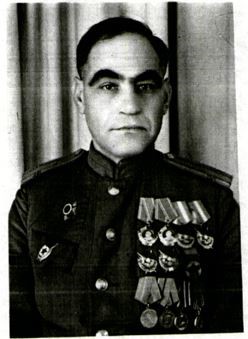Grigorii Akselrod was born in 1900 in Zhytomyr, northern Ukraine. His father Moisei (Moses) was an employee at a furniture factory. Grigorii finished two classes of a state-run Jewish school, which indicates that he had some basic proficiency in Yiddish and Hebrew. However, as an adult, Grigorii stated in his personal military file that he knew only two languages, Russian (his mother tongue) and Ukrainian. In 1916, Grigorii began to work at a hop processing factory. He did not take part in the Russian Revolution, but in 1918 he did join the revolutionary "militia reserve", which was merged into the Red Army in 1919. Akselrod saw action as a cavalryman in the Russian Civil War of 1918-20. Later, in 1921-24, he was involved in the Sovietization of the Caucasus, especially of Georgia. He was wounded twice. In 1929, Akselrod finished a military-political course in Kiev, and in 1933 he graduated in absentia from the Tolmachev Military Political Academy in Leningrad (present-day St. Petersburg). From the late 1920s, his main role in the Red Army was that of a political commissar: in 1929, he was appointed commissar of a cavalry squadron; in 1935, he was promoted to the position of political commissar of an artillery regiment. In 1939-40, Akselrod took part in the Soviet occupation of eastern Poland (in the aftermath of the Molotov-Ribbentrop Pact) and in the Winter War against Finland.
At the time of the outbreak of the Soviet-German War in late June 1941, Grigorii Akselrod served as head of the Department for Political Propaganda of the 14th Rifle Corps. From August 1941 to July 1942, he was deputy head of the Political Department of the Separate Maritime Army, which was defending Odessa and Sevastopol. After the rout of this army, he became the military commissar of the Voronezh Front, which tried to stop the German-Hungarian advance toward Stalingrad in the second half of 1942. From 1943 until his postwar demobilization, Akselrod headed the Political Department of the 9th Guards Rifle Corps; in this capacity, he took part in the crossing of the Dnieper River and saw action in Belorussia, Latvia, and then in Germany. In the course of the war, he was awarded five military orders and a number of medals. His highest rank was that of guards colonel.
After the war, Grigorii Akselrod was thrice nominated for promotion to the rank of major general, but each time his candidacy was vetoed by the high command. In 1951, at the age of 50, he was discharged from the military. Guards Colonel Akselrod lived out the remaining forty years of his life in retirement in Tiraspol, Moldavia (Moldova), where he worked as a volunteer Communist Party propagandist. He died in 1991.







